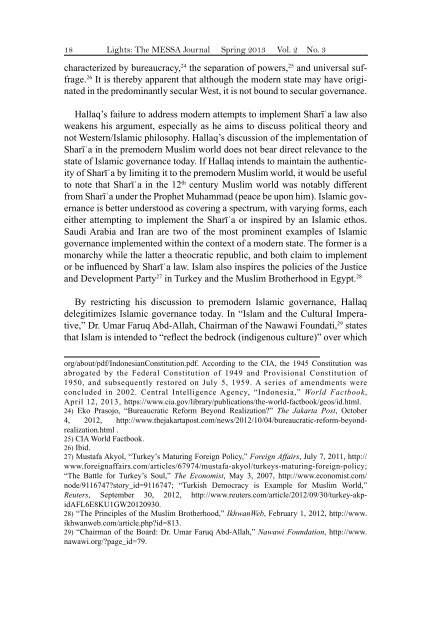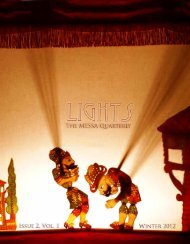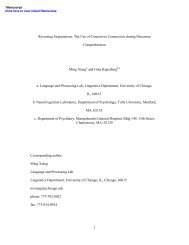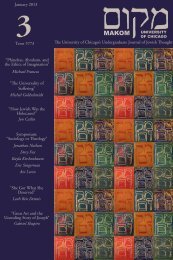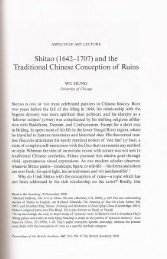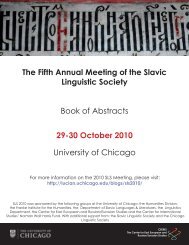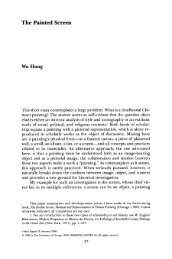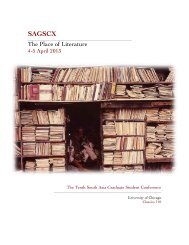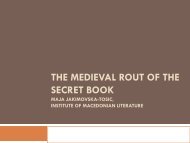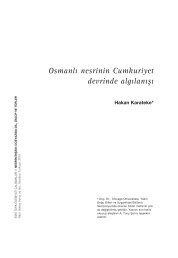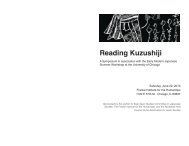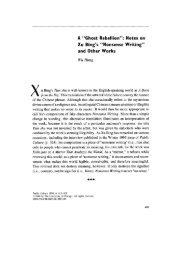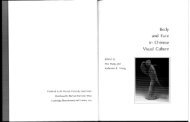You also want an ePaper? Increase the reach of your titles
YUMPU automatically turns print PDFs into web optimized ePapers that Google loves.
18 Lights: The MESSA Journal Spring 2013 Vol. 2 No. 3<br />
characterized by bureaucracy, 24 the separation <strong>of</strong> powers, 25 and universal suffrage.<br />
26 It is thereby apparent that although the modern state may have originated<br />
in the predominantly secular West, it is not bound to secular governance.<br />
Hallaq’s failure to address modern attempts to implement Sharīʿa law also<br />
weakens his argument, especially as he aims to discuss political theory and<br />
not Western/Islamic philosophy. Hallaq’s discussion <strong>of</strong> the implementation <strong>of</strong><br />
Sharīʿa in the premodern Muslim world does not bear direct relevance to the<br />
state <strong>of</strong> Islamic governance today. If Hallaq intends to maintain the authenticity<br />
<strong>of</strong> Sharīʿa by limiting it to the premodern Muslim world, it would be useful<br />
to note that Sharīʿa in the 12 th century Muslim world was notably different<br />
from Sharīʿa under the Prophet Muhammad (peace be upon him). Islamic governance<br />
is better understood as covering a spectrum, with varying forms, each<br />
either attempting to implement the Sharīʿa or inspired by an Islamic ethos.<br />
Saudi Arabia and Iran are two <strong>of</strong> the most prominent examples <strong>of</strong> Islamic<br />
governance implemented within the context <strong>of</strong> a modern state. The former is a<br />
monarchy while the latter a theocratic republic, and both claim to implement<br />
or be influenced by Sharīʿa law. Islam also inspires the policies <strong>of</strong> the Justice<br />
and Development Party 27 in Turkey and the Muslim Brotherhood in Egypt. 28<br />
By restricting his discussion to premodern Islamic governance, Hallaq<br />
delegitimizes Islamic governance today. In “Islam and the Cultural Imperative,”<br />
Dr. Umar Faruq Abd-Allah, Chairman <strong>of</strong> the Nawawi Foundati, 29 states<br />
that Islam is intended to “reflect the bedrock (indigenous culture)” over which<br />
org/about/pdf/IndonesianConstitution.pdf. According to the CIA, the 1945 Constitution was<br />
abrogated by the Federal Constitution <strong>of</strong> 1949 and Provisional Constitution <strong>of</strong><br />
1950, and subsequently restored on July 5, 1959. A series <strong>of</strong> amendments were<br />
concluded in 2002. Central Intelligence Agency, “Indonesia,” World Factbook,<br />
April 12, 2013, https://www.cia.gov/library/publications/the-world-factbook/geos/id.html.<br />
24) Eko Prasojo, “Bureaucratic Reform Beyond Realization?” The Jakarta Post, October<br />
4, 2012, http://www.thejakartapost.com/news/2012/10/04/bureaucratic-reform-beyondrealization.html<br />
.<br />
25) CIA World Factbook.<br />
26) Ibid.<br />
27) Mustafa Akyol, “Turkey’s Maturing Foreign Policy,” Foreign Affairs, July 7, 2011, http://<br />
www.foreignaffairs.com/articles/67974/mustafa-akyol/turkeys-maturing-foreign-policy;<br />
“The Battle for Turkey’s Soul,” The Economist, May 3, 2007, http://www.economist.com/<br />
node/9116747?story_id=9116747; “Turkish Democracy is Example for Muslim World,”<br />
Reuters, September 30, 2012, http://www.reuters.com/article/2012/09/30/turkey-akpidAFL6E8KU1GW20120930.<br />
28) “The Principles <strong>of</strong> the Muslim Brotherhood,” IkhwanWeb, February 1, 2012, http://www.<br />
ikhwanweb.com/article.php?id=813.<br />
29) “Chairman <strong>of</strong> the Board: Dr. Umar Faruq Abd-Allah,” Nawawi Foundation, http://www.<br />
nawawi.org/?page_id=79.


